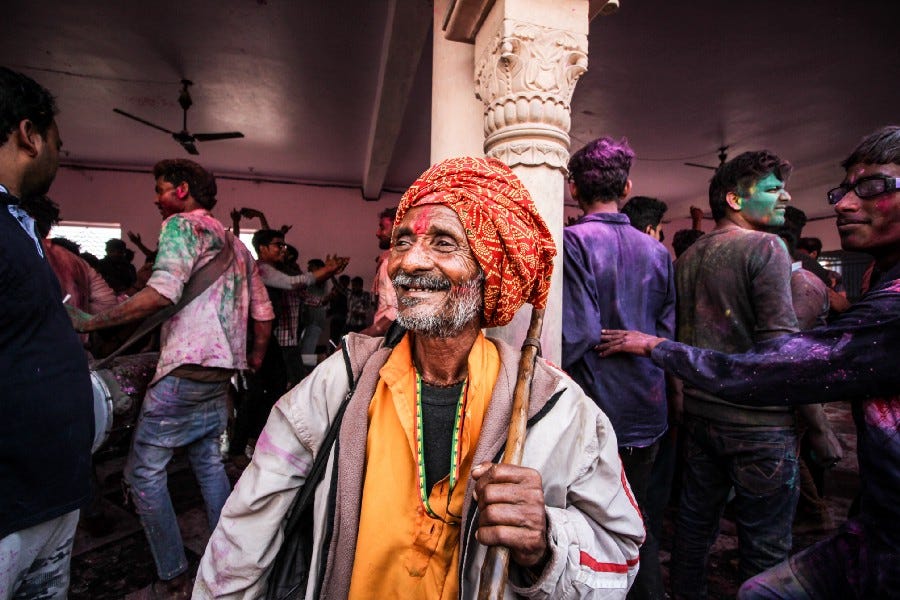What Makes Us Happy?
Asserting ourselves and pursuing goals? Or losing ourselves and doing nothing?

A little while ago I was lying in bed with my mind drifting from place to place, and I suddenly had the thought What is it that we really want, anyway? By “we” I of course meant “everyone who’s ever lived”. When it comes to half-awake philosophical reveries, you’ve got to go hard or go home.
The obvious answer to the question is that we all want to be happy. But what makes us happy? Many say it’s working towards goals, setting targets and achieving them, being productive, contributing in measurable ways to the world. Others say the same things that make so many other animal species happy work for us as well: companionship; a certain level of comfort; finding the right mate; getting enough food, sun, sleep and exercise; generally leading balanced lives.
And still others say that ‘the pursuit of happiness is a pointless goal’: instead, we should be pursuing meaning, which is to be found through serving others rather than obsessing over our own personal bliss. Pleasure comes and goes, so don’t focus on some nebulous state of being — focus on what you can do. The less we aim at attaining happiness, the more satisfied we are.
‘Stop trying to be happy’ is a fairly counterintuitive answer to the question ‘How can I be happy?’, but as usual, the Buddha’s answer was even more radical. There’s a story that may or may not be true — let’s face it, they all may or may not be true at the remove of 2500 years — in which a seeker approaches the Enlightened One and says ‘I want happiness.’ The Buddha’s reply: ‘First remove “I” — that’s ego. Then remove “want” — that’s desire. Now you’re left with happiness.’
In other words, while it may often feel like dissatisfaction is our default setting, our natural condition of being is actually happiness. What keeps interfering with the state Chögyam Trungpa dubs “basic goodness” is the way we cling to a separate self, which alienates us from everything and everyone else, and desire, which tells us that what we have isn’t enough.
The business of life, then, isn’t adding ingredients to our lives until we’ve attained a happiness we don’t already have. The trick is to keep subtracting ingredients until our true nature is revealed; to remove everything that isn’t peace until all that’s left is peace. Ain’t got no, ain’t got no, ain’t got no, I got life.
To recycle a metaphor I’ve used before, this makes us sculptors, not painters. Painters create something that isn’t already there. Sculptors see what’s there beneath what’s there and keep clearing away the debris until everyone else can see it too.

Here’s the thing, though: once you take away desire and even the very notion of being a self, what’s left? What motivates you to do anything, and who’s even there to do it?
It’s a big question, one that’s consistently left Buddhism open to the charge of nihilism. It doesn’t help that nirvana, the famous term for the blissful state of being that accompanies enlightenment, literally translates to something like “blowing out”, “quenching” or “extinguishing”. Once the “fires” of greed, hatred and delusion have been put out, is there anything recognisably human left? Assuming that following the Path is as effective at nullifying suffering as Buddhists say it is, doesn’t it involve nullifying basically everything else as well? Doesn’t “quenching” desire really mean numbing dynamism, motivation and willpower — more like lulling yourself into a numbed-out trance than “waking up”?
An old friend used to refer to Buddhism as ‘morphine for the soul’, and I know what he meant. Asked if we wanted dopamine at any cost, a lot of us would say no. Not all happinesses are created equal, and when you contemplate the caricature of the blissed-out, it’s-all-groovy-man New Ager it’s hard not to be reminded of the fictional soma that keeps citizens mindlessly pacified in Aldous Huxley’s dystopic Brave New World.
Ironically, when the real-life Huxley was given the chance to try mescalin — which, like soma, induces hallucinations and a sense of timelessness — he jumped at the chance. His impressions are preserved in The Doors of Perception, which famously took its name from a quote by William Blake and went on to inspire the moniker of Jim Morrison’s merry psychedelic crew. I recently finished the book, and was taken with several passages that provide a fascinating perspective on the nature and conditions of happiness.
Mescalin treated Huxley to a ‘sacramental vision of reality’ in which a vase of flowers, his furniture and even the creases in his trousers ‘shone with the Inner Light, and [were] infinite in [their] significance’. He felt himself detaching from his body and even his personality, so that he no longer experienced himself as an I but as a “Not-I”. This enabled him to merge with his surroundings, not so much looking at chair legs as ‘actually being them — or rather being myself in them; or, to be still more accurate…being my Not-self in the Not-self which was the chair’. Freed from the prison of being Aldous Huxley, the writer simply was, in the same way the chair legs were — the universe experiencing itself, as the hippies say.

Huxley recorded everything he said during his trip, and reports that his memory and capacity to think were unaffected. But one aspect of his mind did take a severe knock — his motivation: ‘The mescalin taker sees no reason for doing anything in particular and finds most of the causes for which, at ordinary times, he was prepared to act and suffer, profoundly uninteresting. He can’t be bothered with them, for the good reason that he has better things to think about.’
While under the influence, Huxley mostly wanted to be left alone to gaze at his surroundings. He even found it hard to pay attention to his wife or his friend, who were in the room with him: ‘both belonged to the world from which, for the moment, mescalin had delivered me — the world of selves, of time, of moral judgements and utilitarian considerations’.
The writer was equally unmoved by any of the great art and music he exposed himself to while high. It all seemed a bit silly, melodramatic, ego-driven, taken with itself. On the other hand, the folds in his trousers were ‘satisfied to be merely themselves, sufficient in their suchness, not acting a part, not trying, insanely, to go it alone, in isolation from the Dharma-Body, in Luciferian defiance of the grace of God’. (Man can really write can’t he?)
I find it striking that Huxley’s trip has nothing to do with anything that conventional psychology recommends for a satisfying existence. Any therapist I’ve ever had has given me similar normie advice about how to get the most out of life: pursue meaningful activities, get enough exercise, see your friends, go on dates, act first and overthink later. If I were to tell one of them that I’d lost all sense of self, had no interest in the people around me and didn’t feel like doing anything, they’d probably tell me I was severely depressed and most likely dissociating. And yet Doors of Perception keeps talking about beauty, transcendence, infinite significance. Not things you associate with being in a funk.
Of course, I’m not claiming that mental health professionals don’t know what they’re talking about. They can charge the rates they do because their advice works. Human beings are a goal-oriented, prosocial bunch; the evidence is very much in on that. Exercising, dieting, seeing my friends and occasionally getting out of my head do me a lot of good. When I pursue worthwhile projects and achievable goals I feel happy. When I’m drifting around in an aimless vortex I don’t.

On the other hand, a lot of the best experiences of my life have involved meditating, noodling randomly on the piano, getting lost down interesting side-streets in foreign cities, swimming slowly in circles, gazing at Mannerist pictures in galleries, hanging out in cafes, and generally doing nothing remotely productive or useful. And isn’t the same benign purposelessness at work in the great religions’ visions of ultimate bliss? Lying down in green pastures by still waters, frolicking with virgins in gardens, playing harps on clouds…
A lot of the language we use around happiness and pleasure is telling. Isn’t it interesting that we refer to relaxing as “switching off”? Switching what off? What else but the area of the brain where we spend the majority of our time — the control centre responsible for planning ahead, figuring things out, and imposing its will on reality?
What about the even more extreme expression “losing yourself in something”? Isn’t this an admission that our deepest enjoyment comes from getting so absorbed in something we forget that we even exist? Swimming until we become one with the ocean, playing an instrument until we become one with the music, bonding with a loved one until we become one with them, finally ditching our status anxiety and the infinite loneliness that comes with thinking of ourselves as isolated selves?
When you think about it that way, is Buddhism’s “extinguishing” really so nihilistic? Any more than talk of switching yourself off or losing yourself? It seems to me like these are all different ways of talking about the same thing: detaching from the “you” that’s forever reacting to its innate fear by asserting control, defining itself against others and maintaining its place in the pecking order, and identifying with the “big mind” that’s content to just be a part of the Tao. No less concerned with itself and its own gain than a tree, a potted plant or Aldous Huxley’s trouser creases.
Of course there’s a big difference between being on holiday and being at work, surfing the waves of peak experiences and keeping yourself alive. Which must mean that there’s a place for normie happiness and beyond-normie happiness. Actually, I think it’s misleading to call them both “happiness”. The two states don’t feel alike, don’t share the same psychological causes and don’t get the same results, so they shouldn’t be referred to with the same word. It’s time to go a little deeper.



Interesting take.
would you share your thoughts on this? https://proton-9.medium.com/thoughts-of-a-functional-addict-on-mental-health-8952e4e46339